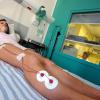Scientists have shown how alcohol damages DNA in stem cells, to help people understand why drinking increases cancer risk.

Much previous research looking at the precise ways in which alcohol causes cancer has been done in cell cultures.
But in this new study, researchers used mice to show how alcohol exposure leads to permanent genetic damage.
Scientists at the Medical Research Council Laboratory of Molecular Biology gave ethanol to mice.
They then used chromosome analysis and DNA sequencing to examine the genetic damage caused by acetaldehyde, which is chemical produced when the body processes alcohol.
They found that it can break and damage DNA within blood stem cells leading to rearranged chromosomes and permanently altering the DNA sequences within these cells.
Professor Ketan Patel, lead author of the study and scientist, said: “Some cancers develop due to DNA damage in stem cells. While some damage occurs by chance, our findings suggest that drinking alcohol can increase the risk of this damage.”
Picture credit | iStock



